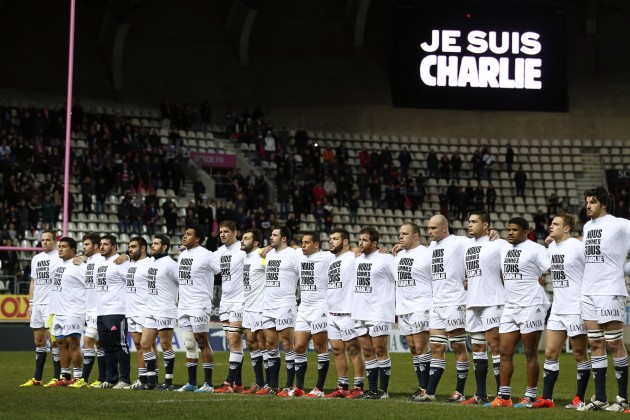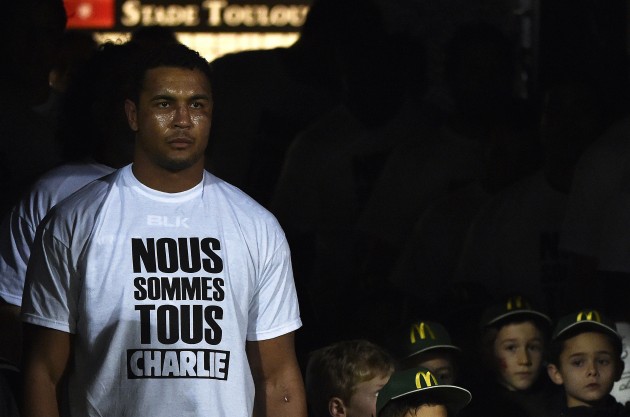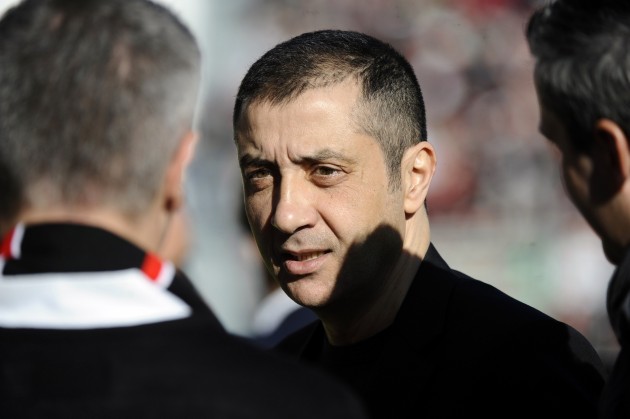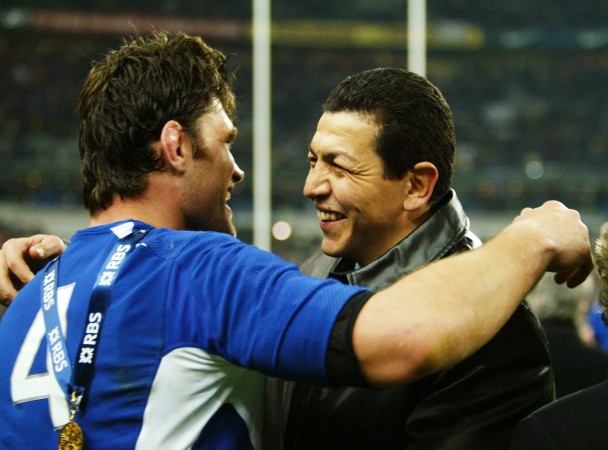The Charlie Hebdo shootings shocked the world and the effect it has had on the French nation has been widespread and profound. French rugby is no different
“Charlie”. It has been the word on everyone’s lips in France during the diabolical events of the past week and a half. Within 24 hours of the murderous attack on the offices of the satirical magazine Charlie Hebdo, Thierry Dusautoir had expressed his shock in an article published on the French edition of the Huffington Post. The captain of France signed off with the rallying cry that was so much in evidence last weekend when an estimated 3.7m French people came together in the streets in memory of the 17 victims – “Je Suis Charlie”.
Rugby expressed its solidarity with a campaign organized jointly by Provale, the players’ union, and the Ligue Nationale de Rugby (LNR). “These are events that obviously concern everybody,” explained Paul Goze, president of the LNR. “In demonstrating our support, it’s also expressing that rugby is not outside society.”
More than 800 t-shirts, each emblazoned with ‘Nous Sommes Tous Charlie’ (We are all Charlie) were distributed to the 30 professional clubs of the Top14 and Pro2. Before each match last weekend the players stood for a minute of silence wearing the t-shirts. Across the country, the minute was followed by a sustained round of applause and then a spontaneous rendition of La Marseillaise.
France rugby supporters found additional comfort in the reaction of the scores of overseas players within its ranks. Aussies, South Africans, Britons, Fijians, Georgians, they all stood with their heads bowed in mute contemplation at the horror of what had unfolded in Paris. Such was the strength of solidarity on show the t-shirts could have read “Nous Somme Tous Francais”.
Monday’s edition of Midi Olympique – its masthead changed to ‘Midi Charlie’ – carried the thoughts of several coaches, presidents and players. Some words had more resonance than others. Business tycoon Mohed Altrad, the president of Montpellier, could barely contain his anger at the perpetrators. He is well placed to express an opinion. Himself an immigrant, Altrad was born a Bedouin in the Syrian desert. After the death of his parents, he came to France in his teens unable to speak the language but determined to build a better life for himself.
Similarly Mourad Boudjellal, Toulon’s colourful owner, and a man whose heritage is part North African Muslim, expressed his revulsion at the attacks. Boudjellal built his fortune from cartoon publishing and was good friends with one of the murdered cartoonists. “Never have I been so proud to be president of Toulon,” he told Midi Olympique, referring to the response of the Stade Mayol crowd before Saturday’s game against Racing Métro. “Never has a minute’s silence been so respected (and) the minute of applause was emotional. Rugby has played its role.”
There have been for many years a small (but increasing) number of Muslims playing professional rugby in France. Among the current crop are Sofiane Guitoune, the Bordeaux-Begles winger selected in France’s Six Nations squad; Olivier Missoup, the Oyonnax flanker; Brive back-rower Saïd Hireche; Bezier wing Sabri Gmir, and Pau second row Abdelatif Boutaty. “I am revolted by these odious attacks,” Boutaty told Midi Olympique. “This people are dirtying Islam. They are using religion as a shield to make up for their own discontent.”
But few figures within French rugby have been as distraught by what happened in Paris as Abdel Benazzi. The first North African Muslim to captain France, the Moroccan-born Benazzi remains one of the finest flankers to wear the blue jersey. In total he played 79 Tests for France, leading them to the Grand Slam in 1997, the same year he was honoured by the then president of the Republic, Jacques Chirac, with his appointment to the Immigration Committee, a prestigious body established in 1989 to assist with the integration into France of foreigners. “I have been wounded in my soul,” declared Benazzi, whose brother lives just 500 metres from the offices of Charlie Hebdo.
Benazzi, like the former France football captain Zinedine Zidane, remains an inspirational figure to North African immigrants. France is not perfect in its attitude towards immigrants but it is possible to achieve success if one works hard. Particularly in sport. In an interview in 2013 Benazzi recalled his formative years in France in the late 1980s, shortly after arriving from Morocco. “My integration into a different culture was a little difficult,” he admitted. “French rugby was a little conservative (at the time). The fact to not eat like everybody, to not drink alcohol, makes you appear like an alien to certain people. But if we discuss with everybody and we stay faithful to our convictions it appears evident that this difference is a richness. Quickly I discovered in sport and in rugby a second family.”
Benazzi encountered racism from supporters and players during his early days in France, brainless bigots who targeted him on the field because of his religion. In an interview earlier this week with a French newspaper, he drew on that experience when asked about cartoons that prompted the attack on Charlie Hebdo. “I can be shocked (by the cartoons) but I cannot respond by force. I can respond only from my heart, my words, by derision, by a letter…but not by force,” explained Benazzi. “God knows that during my rugby career, occasionally, the provocation was pushed to the extreme. If I had responded with violence, I would never have had the career that I did. Instead it made me even more determined to score tries to shut them up.”
Recognising that there is still work to be done by both Muslims and the French State in better integrating the former, Benazzi believes sport has a vital role to play. “Sport is one of the rare areas where there is a mixing and where everybody gets on well together,” he said. “On the pitch we learn to be united, to work together for a common goal…I could do five Masters (degrees) but none would teach me as much as what sport has because of its universal language.”








